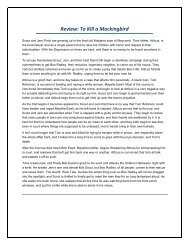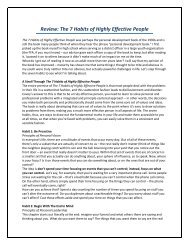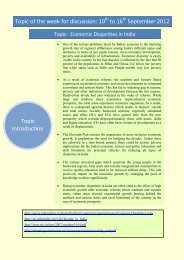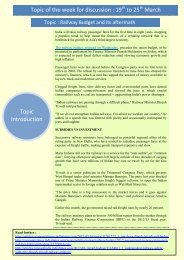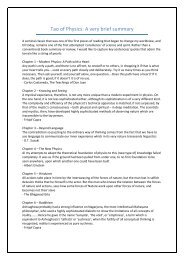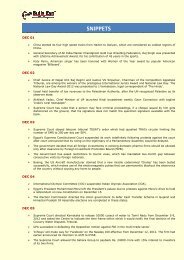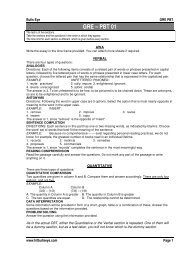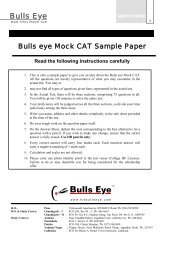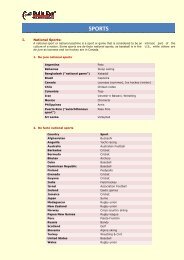KAVERI/CAUVERY WATER DISPUTE - Bulls Eye
KAVERI/CAUVERY WATER DISPUTE - Bulls Eye
KAVERI/CAUVERY WATER DISPUTE - Bulls Eye
Create successful ePaper yourself
Turn your PDF publications into a flip-book with our unique Google optimized e-Paper software.
This time however, the Karnataka government in open defiance of the order of the CRA, refused to release any<br />
water succumbing to the large scale protests that had mounted in the Kaveri districts of the state. Tamil Nadu<br />
aghast at the defiance, went back to the Supreme Court. Karnataka now resumed the release of water for a few<br />
days, but stopped it again on 18 September as a protesting farmer committed suicide by jumping into the<br />
reservoir and the protests threatened to take a dangerous turn.<br />
The centre now stepped in and asked Karnataka to release the water. The SC meanwhile, in response to Tamil<br />
Nadu's petition asked the CRA for details of the water release and water levels in the reservoirs. The CRA in turn<br />
ordered for the inspections of the reservoirs. While the CRA inspected the reservoirs in Karnataka, Tamil Nadu (on<br />
23 September) flatly refused to grant them permission to inspect its reservoirs. This move by Tamil Nadu Chief<br />
Minister, coupled with her earlier walkout and boycott of the CRA meets, came in for severe criticism from all<br />
quarters. On 30 September the Supreme court ordered Tamil Nadu to co-operate with the CRA and Tamil Nadu<br />
gave in.<br />
The flare up had by now, well and truly taken an ugly turn and there were accusations and counter accusations<br />
being thrown all around in both states. The opposition parties in Tamil Nadu too had jumped into the fray and at<br />
the same time joining Jayalalitha in stinging rebukes of both the Centre and the CRA, while the opposition parties<br />
in Karnataka expressed their full solidarity with the Congress-led Karnataka government to protect their right to<br />
the Kaveri water.<br />
To add to all this, the dispute had already spilled onto the streets in the district of Mandya in Karnataka and was<br />
threatening to spread to other parts of the state too. Precipitating the matters on the streets, the SC ordered<br />
Karnataka on 3 October to comply with the CRA and resume the release of water.<br />
Karnataka once again refused to obey the orders of SC. Tamil Nadu slapped another contempt petition on<br />
Karnataka and soon the issue degenerated into a 'free for all' with all and sundry from both states joining the<br />
protests. Soon, film actors and various other cross sections of society from both states were on the streets. Tamil<br />
TV channels and screening of Tamil films were blocked in Karnataka. Also all buses and vehicles from Tamil Nadu<br />
were barred from entering Karnataka. The belligerence soon hit a crescendo with Tamil activists calling for a<br />
stoppage of power from the Neyveli Power station to Karnataka as a tit-for-tat measure. A Pan-Tamil militant<br />
outfit (a month or so later) went ahead and blasted a major power transformer supplying power to the<br />
neighbouring states of Karnataka and Andhra Pradesh.<br />
The Karnataka Chief Minister, Mr. S. M. Krishna on the other hand, fearing that the situation might spiral out of<br />
control, embarked on a padayatra from Bangalore to Mandya. While some saw this as merely a gimmick, some,<br />
like U R Ananthamurthy saw it as a good faith effort to soothe tempers and joined him in the yatra.<br />
2003–2006<br />
This period did not see any major flare up in the dispute even though the summer of 2003 saw a dry spell in both<br />
states. The monsoons in 2004, 2005 and 2006 was quite copious and this helped a great deal in keeping the<br />
tempers calm. While the last 3 or 4 years have been relatively quiet as far as jingoistic voices are concerned, a<br />
flurry of development has been afoot in the courts.<br />
The term of the tribunal was initially set to expire in August 2005. However, in the light of the many arguments<br />
the court was yet to hear, the tribunal filed a request for extension of its term. The extension was granted and the<br />
tribunal's term was extended for another year until September 2006. Early in 2006, a major controversy erupted<br />
over the 'Assessor's report' that was apparently 'leaked' to the press. The report had suggested a decision which<br />
Karnataka summarily rejected. Another major controversy erupted when just a couple of months before the<br />
September 2006 deadline, the tribunal recommended the formation of another expert committee to study the<br />
'ground realities' yet again. This was unanimously and vehemently opposed by all the four states party to the



